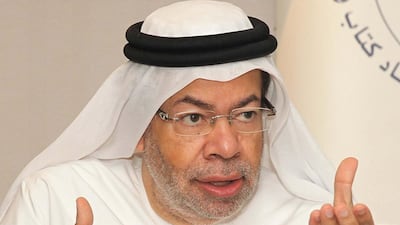Habib Al Sayegh, the renowned Emirati poet, author and journalist, died on Tuesday.
He was 64. One of the country’s most prominent poets and authors, Al Sayegh was widely credited with helping to set the stage for other Emirati writers to emerge.
Social media was awash with tributes on Tuesday, led by Sheikh Mohammed bin Rashid, Vice President and Ruler of Dubai, who said the UAE had lost a “pillar of media, journalism and literature”. On Twitter, he wrote: “His work, poetry and love for his country will remain his best legacy.”
Sheikh Mohamed bin Zayed, Crown Prince of Abu Dhabi and Deputy Supreme Commander of the Armed Forces, said: “The UAE today lost someone of high literary and cultural stature.” Al Sayegh “enriched the UAE and Arab scene with his valuable work,” he wrote on Twitter.
Sheikh Hamdan bin Mohammed, Crown Prince of Dubai, also tweeted his condolences, saying Al Sayegh was “one of the distinguished journalists who left their mark on the country’s press”.
Sheikh Hazza bin Zayed, Vice Chairman of Abu Dhabi Executive Council, said Al Sayegh made a “significant impact on the development of the UAE media and literary scene”.
“He left behind a creative legacy that will continue to be a source of pride and serve as an education for future generations.”
Dr Anwar Gargash, Minister of State for Foreign Affairs, was among the first to offer his condolences yesterday, saying the UAE had lost a creative writer and “strong pen”.
“We lost Habib while he was at the height of his literary, intellectual and patriotic career.
“I will miss him as a friend, a creative writer and I offer my condolences to his family and loved ones,” Dr Gargash said on Twitter.
Abu Dhabi Media also posted a tribute on Twitter, describing Al Sayegh as “a distinct writer who always had strong views, logic and words”, while Dubai Press Club said “the Arab world today has lost a great media and literary figure”.
His friends and colleagues were devastated to hear of his passing.
Emirati writer and poet Mira Al Qassim, who was out of the country when she found out, said she could not believe that he had died.
“He was a father, a brother and a friend who took all us poets and writers under his wing,” she said. A member of the Emirates Writers Union, Ms Al Qassim – who knew Al Sayegh for 18 years – said she frequently spoke to him.
“The last we spoke was before I travelled three weeks ago. The UAE has lost a great man.” Mohammed Al Hammadi, a member of the board and financial manager of the Emirates Writers Union, said he had always known of Al Sayegh’s legacy but worked closely with him only over the past five years.
He said the UAE and Arab world had lost a cultural figure “whose fingerprints are in every literary person throughout the last 45 years”.
“He has dedicated more than half his life to the culture and citizens of the UAE.
“Never before were young writers a part of the board but Habib believed that it was important that they were.”
Al Sayegh was considered one of the driving forces behind the UAE’s cultural movement.
His poems were translated into several languages, including English, French, German, Italian, Spanish and Chinese. Known as a pioneer of journalism in the UAE, he began publishing a daily column – which would become the longest-running column in the Emirates – in February, 1978, six years after the UAE was formed.
He was responsible for editing the Pen Club — the first page dedicated to promising journalistic talents — in Al Ittihad newspaper in 1978 and, two years later, established the first cultural supplement in the UAE for Al Fajr newspaper. Until his death, he served as editor-in-chief of Arabic language daily Al Khaleej. Al Sayegh became director of internal media at the Ministry of Information and Culture in 1977, and was deputy editor of Al Ittihad newspaper in 1978.
He also founded Awraq, a cultural magazine, and was its editor-in-chief from 1982 to 1995. In 2015, he was unanimously elected as the secretary general of the General Union of Arab Writers. At the time, Mohammad Salmawi, the outgoing secretary general of the union, said: "We are confident that Al Sayegh will be the trusted person who will push the union forward and enrich its experiment."
Al Sayegh was a fixture of the local literary scene. Rarely did a literary gathering take place in the UAE without him being present or his name mentioned.
He had been writing since the late 1960s, with publications including his collections Poems to Beirut (1980), Tomorrow (1995) and 2012's simply titled Collection of Poems.
That same year, he was named Cultural Personality of the Year at the Sharjah International Book Fair.
Born in 1955, Al Sayegh received his Bachelor of Philosophy in 1977 and completed his Master of Comparative Linguistics from the University of London in 1998.
Al Sayegh will be buried in his home emirate of Abu Dhabi on Tuesday and the family will receive condolences beginning Wednesday.

